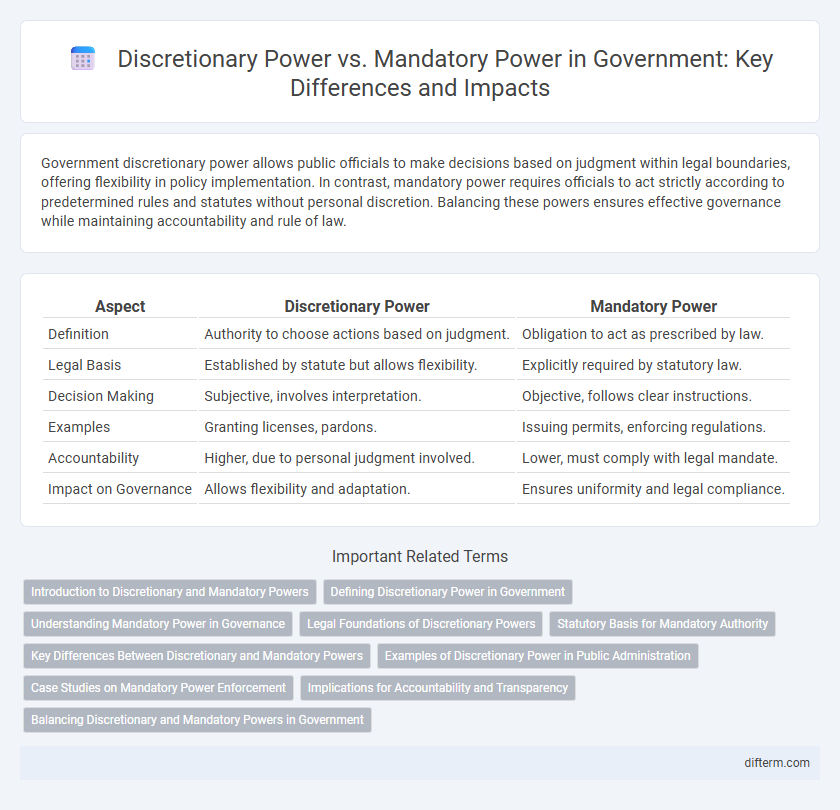Government discretionary power allows public officials to make decisions based on judgment within legal boundaries, offering flexibility in policy implementation. In contrast, mandatory power requires officials to act strictly according to predetermined rules and statutes without personal discretion. Balancing these powers ensures effective governance while maintaining accountability and rule of law.
Table of Comparison
| Aspect | Discretionary Power | Mandatory Power |
|---|---|---|
| Definition | Authority to choose actions based on judgment. | Obligation to act as prescribed by law. |
| Legal Basis | Established by statute but allows flexibility. | Explicitly required by statutory law. |
| Decision Making | Subjective, involves interpretation. | Objective, follows clear instructions. |
| Examples | Granting licenses, pardons. | Issuing permits, enforcing regulations. |
| Accountability | Higher, due to personal judgment involved. | Lower, must comply with legal mandate. |
| Impact on Governance | Allows flexibility and adaptation. | Ensures uniformity and legal compliance. |
Introduction to Discretionary and Mandatory Powers
Discretionary powers allow government officials to make decisions based on judgment and situational factors within legal boundaries, providing flexibility in policy implementation. Mandatory powers require strict adherence to laws or regulations, compelling officials to act in a prescribed manner without personal interpretation. Understanding the distinction between discretionary and mandatory powers is critical for ensuring accountability and proper governance.
Defining Discretionary Power in Government
Discretionary power in government refers to the authority granted to public officials to make decisions based on their judgment within the framework of existing laws and regulations. This power allows flexibility in applying rules to specific cases, enabling officials to consider unique circumstances and public interest. Unlike mandatory power, which requires officials to act in a predetermined manner, discretionary power involves choice and interpretation in policy execution.
Understanding Mandatory Power in Governance
Mandatory power in governance refers to authority that government officials must exercise according to specific legal directives, leaving no room for personal judgment or discretion. This type of power ensures consistency, adherence to laws, and accountability by binding public authorities to execute duties strictly as mandated by statutory provisions. Understanding mandatory power is crucial for recognizing limits on administrative freedom and reinforcing the rule of law within public administration.
Legal Foundations of Discretionary Powers
Discretionary powers in government derive their legal foundations from statutes granting officials the authority to make decisions based on judgment rather than strict rules. These powers allow flexibility in administration but are bounded by principles of legality, reasonableness, and procedural fairness to prevent abuse. Courts maintain oversight to ensure discretionary decisions comply with enabling legislation and constitutional mandates.
Statutory Basis for Mandatory Authority
Mandatory power derives its authority directly from statutory laws enacted by legislative bodies, requiring public officials to perform specific duties without discretion. This statutory basis ensures that mandatory powers are clearly defined, limiting administrative flexibility and enhancing accountability in government operations. In contrast, discretionary power allows officials to choose among various courses of action, but mandatory authority mandates compliance with precise legal requirements.
Key Differences Between Discretionary and Mandatory Powers
Discretionary power allows government officials to make choices based on judgment within legal boundaries, while mandatory power requires strict adherence to legal rules without room for personal judgment. Key differences include the scope of decision-making authority, where discretionary power provides flexibility to adapt to circumstances, whereas mandatory power enforces specific actions or outcomes. Discretionary powers are often subject to review to prevent abuse, whereas mandatory powers ensure uniformity and compliance with established laws.
Examples of Discretionary Power in Public Administration
Discretionary power in public administration includes decisions such as granting licenses, allocating public funds, and prioritizing projects based on available data and community impact assessments. Government officials leverage this power when determining the extent of law enforcement in minor offenses or adjusting social welfare benefits to meet changing local needs. These examples illustrate how discretion allows flexibility and responsiveness within the framework of public policy implementation.
Case Studies on Mandatory Power Enforcement
Mandatory power enforcement ensures government officials comply with statutory duties, reducing discretionary interpretation variability and promoting legal certainty. Case studies, such as Chevron U.S.A., Inc. v. Natural Resources Defense Council, highlight courts enforcing mandatory powers to uphold regulatory mandates without deviation. These precedents emphasize strict adherence to legislative intent, enhancing accountability and governance efficiency.
Implications for Accountability and Transparency
Discretionary power allows government officials to make decisions based on judgment, which can enhance flexibility but increase risks of arbitrary actions and reduce transparency. Mandatory power requires adherence to specific rules, ensuring consistent application and easier accountability but may limit responsiveness to unique situations. Balancing these powers is crucial for maintaining effective oversight and fostering public trust in governance.
Balancing Discretionary and Mandatory Powers in Government
Balancing discretionary and mandatory powers in government requires strategic oversight to ensure effective decision-making while maintaining accountability and transparency. Discretionary power allows government officials flexibility to adapt policies to complex situations, whereas mandatory power enforces strict adherence to laws and regulations to prevent abuses. Optimal governance achieves a dynamic equilibrium that promotes responsiveness without compromising legal consistency or citizens' rights.
Discretionary power vs Mandatory power Infographic

 difterm.com
difterm.com